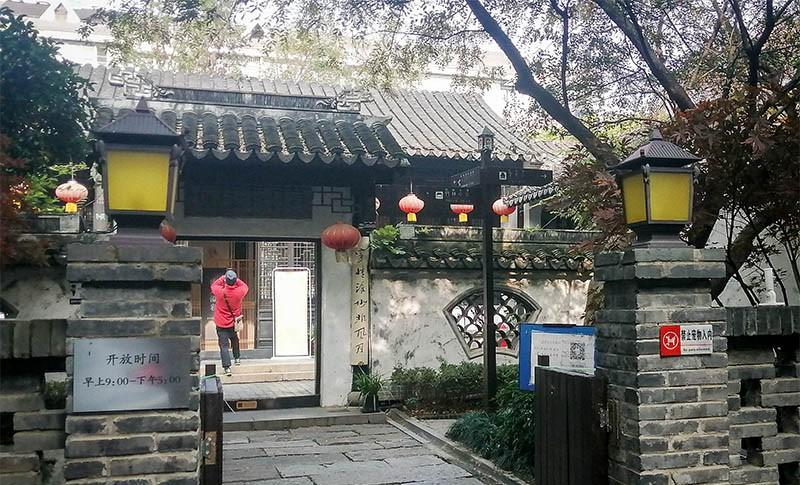
Wu Jingzi Memorial Hall at No. 18 Dongguantou, Qinhuai District, Nanjing, Jiangsu Province. (Li Lun Photography)
Wu Jingzi Memorial Hall, covering an area of about 800 square meters, sits north and faces south. (Li Lun Photography)
Wu Jingzi Memorial Hall Second Entrance Courtyard Yang Lian: Frustrated why not a thousand years of pen, pouring out a river wind. (Li Lun Photography)
The courtyard of Wu Jingzi's former residence, towering ancient trees and flower walls and bamboo hedges are interspersed with fun. (Li Lun Photography)
When the Wu Jingzi Memorial Hall first opened, it was charged a 5 yuan entrance fee, and now it is free to visit. (Li Lun Photography)
Wu Jingzi Memorial Hall, located at No. 18 Dongguantou, Qinhuai District, Nanjing, Jiangsu Province, is a courtyard with Jiangnan architectural style, covering an area of about 800 square meters, with towering ancient trees and flower-walled bamboo hedges. For the first time, the museum restores Wu Jingzi's life experience and reproduces the stories of the popular population in "The History of Ru Lin". According to reports, this memorial hall is closest to the location of the historical Wu Jingzi residence "Qinhuai Water Pavilion". In the Qinhuai Water Pavilion, Wu Jingzi lived for 19 years, where he created and completed China's famous satirical novel "The History of Ru Lin".
Wu Jingzi is a very special character, and the thirty-fourth time in the "History of Ru Linwai" borrows Mr. Gao's criticism of Du Shaoqing to depict his own spiritual outlook: his son is even more nonsensical, mixed with mixed eating, monks and Taoists, craftsmen Andako, all pull each other, but refuse to be with a serious person. In less than ten years, sixty or seventy thousand silver were stripped away. TianchangXian could not stand, moved to the city of Nanjing, and carried Nai to the tavern to eat wine every day, holding a copper cup in his hand, like begging for food.
Wu Jingzi (1701-1754) was not born into a poor family, on the contrary, he was born into a very rich bureaucratic landlord family, 18 years old, a young and prosperous nobleman. There are fourteen or five officials in the family who have meritorious names such as jinshi and juren, and there are not counted such as gongsheng and xiucai, which can be described as a prosperous family of gentry.
When Wu Jingzi was 23 years old, his father returned home because he had offended his superiors, and soon fell ill and died. Before and after his father lost his official position, Wu Jingzi saw the ugliness of falling for each other in the official arena. He inherited a rich inheritance, and the clan deceived him into a lonely position and deliberately usurped it, which made him see the coldness of the human world, and thus generated a dislike and rebellion against the family. Before the age of 30, Wu Jingzi, who was generous and charitable and not good at maintaining the family, sold out all his land and real estate, and was a loser in the eyes of the clansmen who "sold all the fields and was rumored to be a disciple in the township".
Wu Jingzi, who was penniless, moved to Nanjing at the age of 33 and began his career as a literary seller, often living a difficult life of poor clothes and food. It is said that every winter, Wu Jingzi had no money to buy wine to keep warm, so he invited his friends to "warm their feet around the city" at night, and walked around the nanjing city wall by the moonlight until dawn, walking into the water west gate and dispersing.
Wu Jingzi deeply resented the darkness of the officialdom at that time, the ugliness of the scholars' pursuit of fame and fame, and the shallowness of the world, so he pinned his cynicism on literary creation and wrote "The History of Ru Linwai". The fifty-six chapters of the "History of Ru lin wai" are connected by a number of vivid stories, which is a real picture of life in feudal society. The impoverished life prematurely took Wu Jingzi's life, and he died of illness shortly after completing the Outer History of Ru Lin, living for fifty-three years.
Every era will have such a "foreign history", and Wu Jingzi wrote down his era with a clever pen. "The History of Rulin" laid the cornerstone of China's satirical novels, represented the peak of China's ancient satirical novels, and was translated into English, French, German, Russian, Japanese, Spanish and other languages abroad.